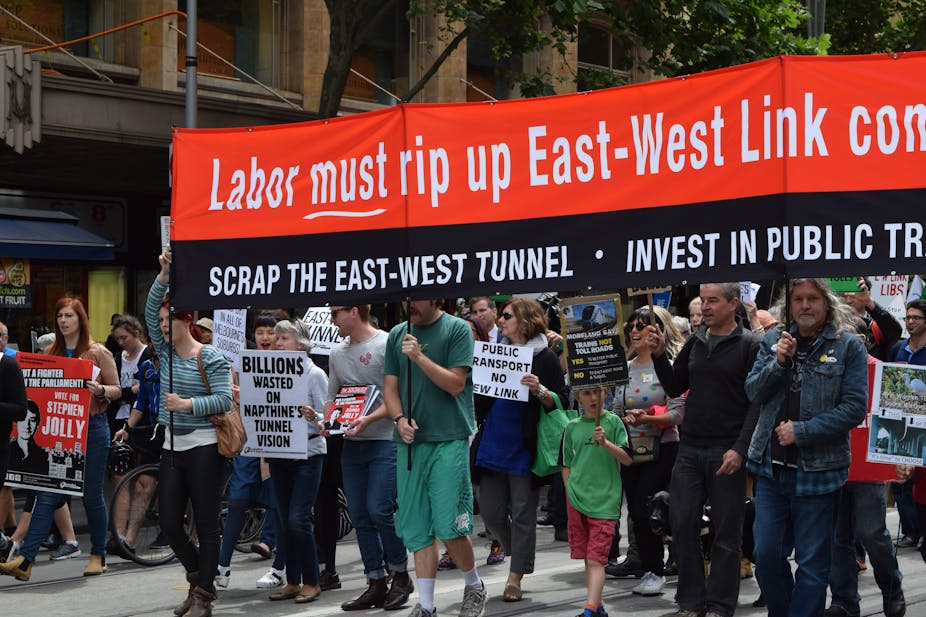Infrastructure projects are ripe for political point scoring. None more so than Private Public Partnerships (PPPs), which allow private companies to profit from key infrastructure. Yet political debate, especially during an election, overlooks why key projects actually need PPPs.
As governments face shrinking revenues and increasing infrastructure needs, PPPs can be used to harness private sector finance and increase the total spending on projects.
These structures enable governments to provide key infrastructure such as roads, schools and hospitals that might otherwise be unaffordable, or provided over a substantially longer time frame if traditional public debt financing was used.
The primary argument for PPPs is they provide a better value-for-money proposition. Privately financed projects, incentivised by the “profit motive”, are better able to bring projects to completion on time and on budget. Studies within Australia show PPPs experience lower cost over-runs (4.3% compared to 18%) and less construction delay (1.4% compared to 25.9%) than traditionally procured infrastructure.
PPPs also need to source their revenue, and recoup their costs, from customers who are willing to pay for the use of the infrastructure. This need to attract users helps ensure consumers are given a greater value proposition with respect to service and quality.
For the private sector, PPPs offer a potential conceded revenue stream. However, in order to capture this “reward”, the private sector bears a number of risks. These include completion, maintenance and demand risk. Only if the asset performs to its contractual specifications is the private sector able to realise the investment.
In order to complete due diligence, debt financiers spend a lot of time and money on understanding and pricing risk. Other costs are incurred in the planning and design phase of tendering for projects such as geotechnical work, engineering design and market analysis. Altogether they represent a significant investment by the private sector, often in the vicinity of A$15 to $25 million.
Once a bid is awarded, the winner often is tied to the outcome of that single project. The majority of bidders do not have the ability to diversify over multiple activities; they invest their resources in a small number of projects or even a single PPP.
Consequently, once a PPP is determined as being the best tool to finance a desired piece of infrastructure, it is important that the playing field over which the risks and responsibilities will be assigned is stable. Any changes to the rules of the game can leave the private tenderer out of pocket and highly exposed to further losses. For this reason, the private sector negotiates compensation clauses should the government position change.
The East-West link fallout
The announcement in Victoria that, if elected, a Labor government will scrap the East-West link is an example of why such clauses are included. It is also an example of what can happen if infrastructure decisions are made for the wrong reasons.
Should the East-West link be abandoned, Victorian taxpayers stand to lose in excess of A$1 billion in compensation payments to the private entities involved in the winning tender. This compensation significantly erodes the benefits of a PPP’s structure, such as the ability to free up public capital to spend on other government services and to avoid levying higher taxes to finance infrastructure investments.
These losses are not confined to the current project. Realised political risks will have a cascading effect across the portfolio of infrastructure requirements.
When done properly, PPPs create an efficient and productive working partnership between the public and private sector. The erosion of good faith in PPP negotiations will have a detrimental impact on subsequent private sector investment.
The private sector already views infrastructure as a risky prospect without the government fickleness. A government backtrack on the project will have a negative impact on any hope of increasing private sector engagement in the space, including harnessing superannuation funds.
Reneging on signed agreements will also send a signal to the market that Victoria is a risky place to do business. It will make it difficult to attract PPP tenders without significant price increases to compensate for the increased risk.
The scenario highlights why infrastructure decisions should not be used as a political football.
Good infrastructure is important for economic growth, job creation and living standards. Victoria would be wise to adopt a more systematic approach to prioritising and selecting good infrastructure projects.
A considered approach to infrastructure decision making will provide better certainty for both the market and the community, enabling future decisions to be made with more confidence.

